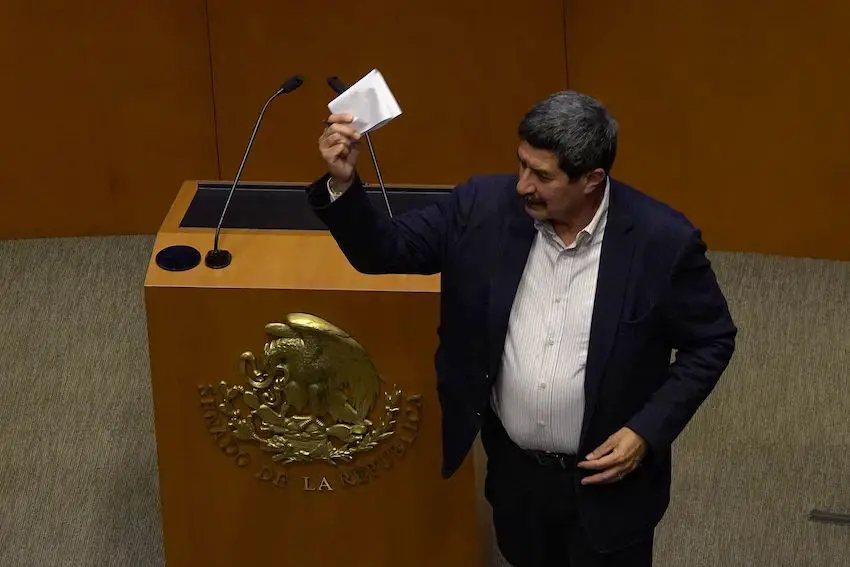The Mexican government wants to make living in a corruption-free environment a constitutionally enshrined human right.
Senator Javier Corral, a lawmaker with the ruling Morena party and a former governor of Chihuahua, said last week that in the coming months, he would present an initiative to create a General Law for the Investigation and Punishment of Acts of Corruption.

Speaking in the state of Morelos at an annual meeting of Mexico’s anti-corruption prosecutor’s offices, Corral said that President Claudia Sheinbaum had entrusted him with the task of examining the best ways that corruption can be combated. While governor of Chihuahua, he made bringing his predecessor César Duarte to justice on corruption charges a central aim of his government.
The proposed law Corral is slated to present to Congress would enshrine in the constitution a new human right: the right to live in a corruption-free environment and to enjoy responsible and lawful public administration by Mexican authorities.
According to the newspaper El País and a statement from Mexico’s Senate that summarized Corral’s remarks last week, the law would:
- Allow the creation of a uniform nationwide anti-corruption investigation and prosecution policy.
- Establish a national system that assists anti-corruption collaboration between federal and state governments, including in the realm of intelligence gathering.
- Seek to ensure that acts of corruption are effectively punished and that those found guilty of the crime don’t continue to benefit from their wrongdoing.
- Seek to ensure that misspent public resources are recovered.
- Create new anti-corruption prosecutor’s offices and courts.
- Allow people who report corruption to participate more closely in the criminal prosecution of the case if they demonstrate they have a legitimate interest in it.
- Recognize people involved in the investigation and prosecution of corruption as defenders of human rights.
Former president Andrés Manuel López Obrador made combatting corruption a central aim of his administration, and less than a year into his six-year term declared that there was “zero corruption” in the federal government as a result of his dedication to “sweeping away” what had developed over the previous 30 years.
But Sheinbaum believes there is more work to do, such as disbanding a number of autonomous government agencies. She recently said that the elimination of seven such agencies — as approved by the Senate last week — would lead to “more transparency” in government and help to eliminate corruption.
Corruption has long been a problem in Mexico, with various scandals plaguing the 2012-18 government of former president Enrique Peña Nieto. Despite López Obrador’s determination to eliminate corruption — and his declarations that he had achieved his goal — his administration also faced accusations of corruption, including ones related to Mexico’s food security agency Segalmex and the Youths Building the Future apprenticeship scheme.
While corruption is common in Mexico, so too is impunity for that crime — and various others.
Even if a person is convicted of corruption and serves jail time, the money and/or assets they obtained as a result of their crime are not “normally” recovered, El País reported.
As mentioned above, one of the objectives of the proposed General Law for the Investigation and Punishment of Acts of Corruption is to change that situation.
In Morelos last week, Corral — who was affiliated with the National Action Party until joining Morena this year — described corruption as a “social cancer” that weakens Mexico’s democratic institutions and the rule of law.
According to the statement issued by the Senate last Wednesday, he also said that his proposed law would seek to stop Mexico’s “culture of impunity” from being an incentive for the proliferation of corruption. Corral noted that Mexico’s anti-corruption prosecutor’s offices have a central role in the fight against corruption and in restoring citizens’ confidence in Mexico’s institutions.
“But let’s not fool ourselves,” he added. “Combating corruption is not and never will be a simple task.”
With reports from El País
